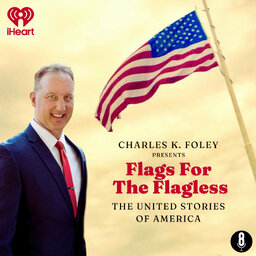Waving the Future: A Conversation with Bob Caggiano of Annin Flagmakers
Have you ever wondered where U.S. flags come from and who makes them? Charley interviews Bob Caggiano, VP Sales at Annin flags, who discusses the rules of the flag, Annin’s history in making U.S. flags, and a special Annin flag that covered the casket of President Abraham Lincoln.
In 1 playlist(s)
Flags for the Flagless
"Flags for the Flagless" is a poignant podcast that shares heartfelt stories of resilience, patrioti…Social links
Follow podcast
Recent clips

Protecting Our Flag
25:13

Never Forgotten - A Special 9/11 Episode Pt. 2
14:38

Never Forgotten - A Special 9/11 Episode Pt. 1
30:13
 Flags for the Flagless
Flags for the Flagless